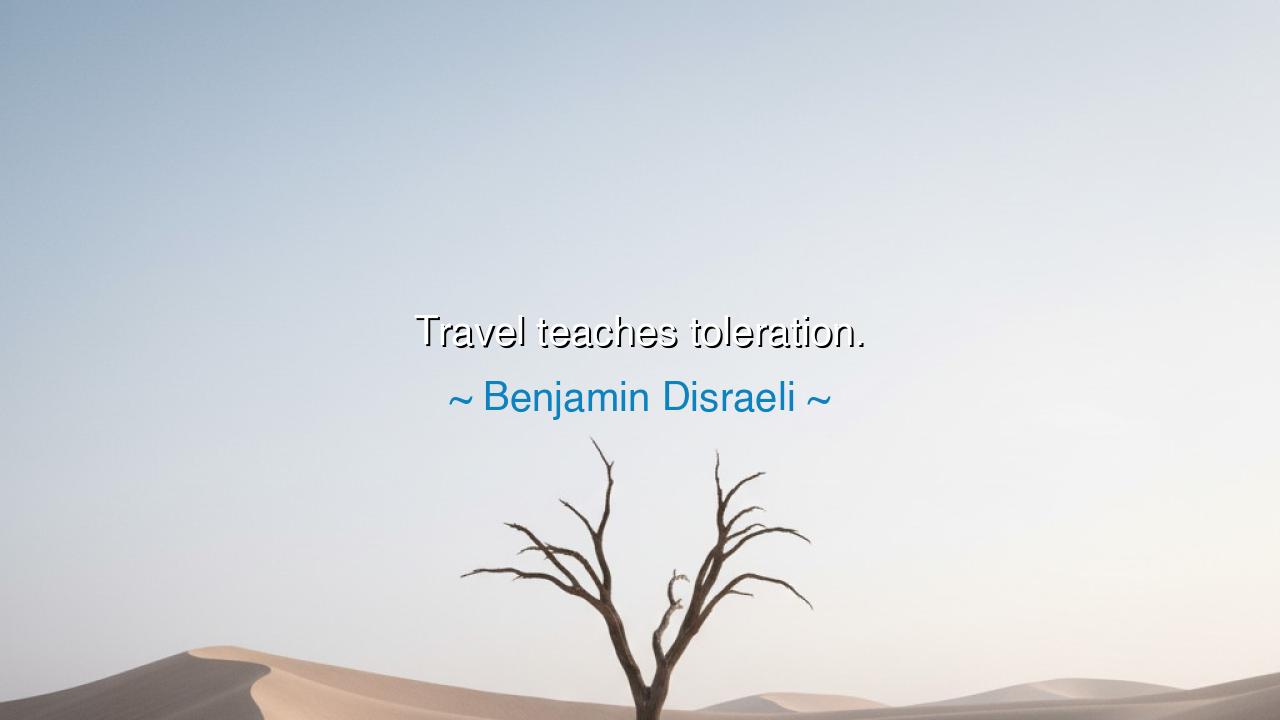
Travel teaches toleration.






Hear the brief but thunderous wisdom of Benjamin Disraeli: “Travel teaches toleration.” In these four words lie the crossing of oceans, the bridging of cultures, and the breaking of walls that separate one soul from another. This is not merely advice for wanderers of earth and sky—it is a law of human growth. For when one departs the narrow gate of his own village, and steps upon the wide road of the world, his heart is stretched, his mind awakened, and his pride humbled.
What is the meaning of this? The man who has never left his dwelling imagines that his way of life is the measure of all things. He believes his customs, his food, his tongue, his faith to be the natural law of humankind. But when he travels, he beholds that what was strange to him is precious to another; that what he considered truth is but one star among many in the sky. And so, the arrogance of ignorance falls away, and in its place grows toleration—the noble art of allowing another to be, without scorn, without fear.
Consider the journey of Herodotus, the ancient Greek who wandered to the lands of Egypt and Persia, who observed the customs of kings and the prayers of common men. He recorded that every people believed their own ways best, yet he himself, through his travel, learned to see all ways as worthy of study and remembrance. From his journeys was born not disdain, but respect. He embodied Disraeli’s saying, for by walking in the paths of strangers, he became a teacher of toleration to generations.
The wisdom of the quote is also tested in the fires of history. When merchants of Venice journeyed to the East, they returned not only with silks and spices, but with knowledge of other tongues, other foods, other faiths. It was this mingling of worlds that enriched Europe, though not without struggle. Where men feared difference, war and suspicion arose; but where they practiced toleration, the seeds of renaissance and discovery bloomed. Thus, travel is a double-edged blade: it may harden prejudice in the fearful, or, in the courageous, it may carve open the heart to compassion.
Let us not forget the simple pilgrim, who walks not to conquer but to understand. The Muslim at Mecca, the Christian on the road to Santiago, the Buddhist crossing mountains to holy shrines—each meets companions from nations unknown. And in their steps they learn the truth: that the divine breath moves in every man, no matter his language or skin. In this way, travel reveals that we are one, though clothed in many garments.
So what lesson do we take? That to become wise, one must leave the comfort of his own walls. To speak of toleration without journeying is to speak of seas without ever seeing the shore. Therefore, let each person travel as they can—not only across continents, but into the stories of others, into the neighborhoods beyond their own, into the hearts of those unlike themselves. For every step taken into difference is a step taken into greater humanity.
Practical counsel follows: seek out the unfamiliar, whether by road, by book, or by friendship. Sit at a stranger’s table; taste food you do not know; listen to music in a language you do not speak. In doing so, you travel beyond the prison of the self, and in that travel, you learn the highest of arts: toleration. For he who walks the world with open eyes finds that all men are his kin, and all lands, though strange, are worthy of reverence.






AAdministratorAdministrator
Welcome, honored guests. Please leave a comment, we will respond soon